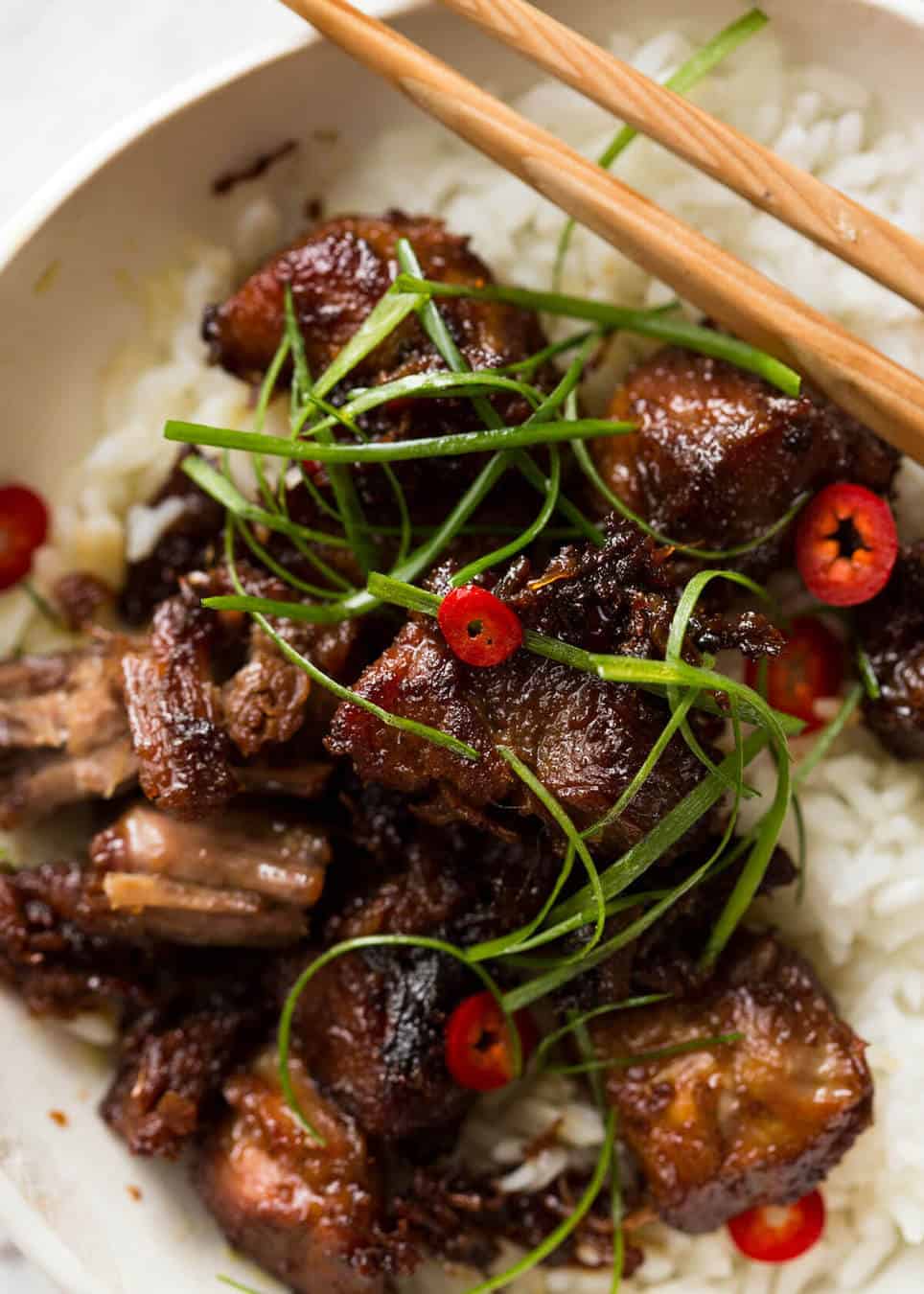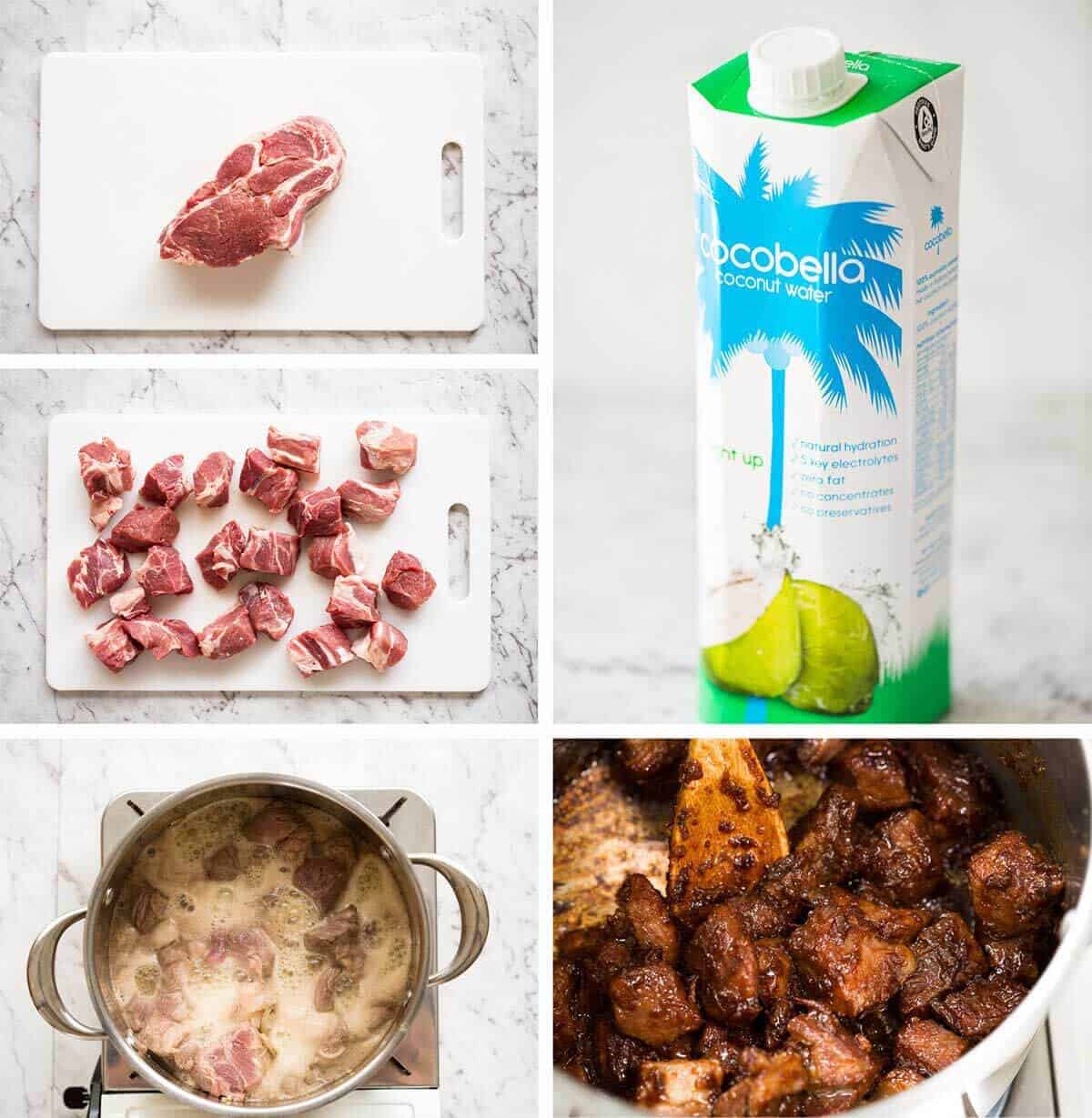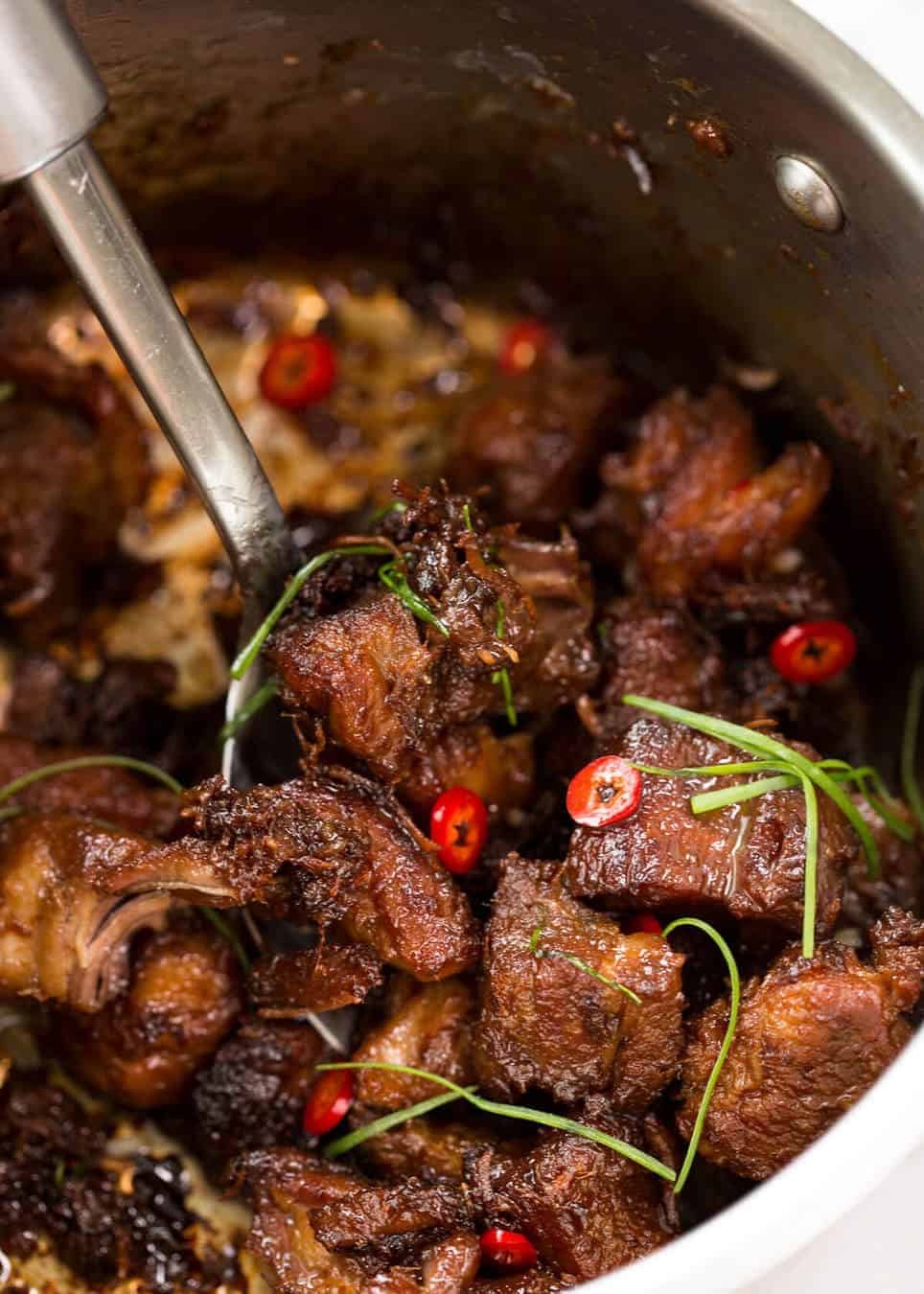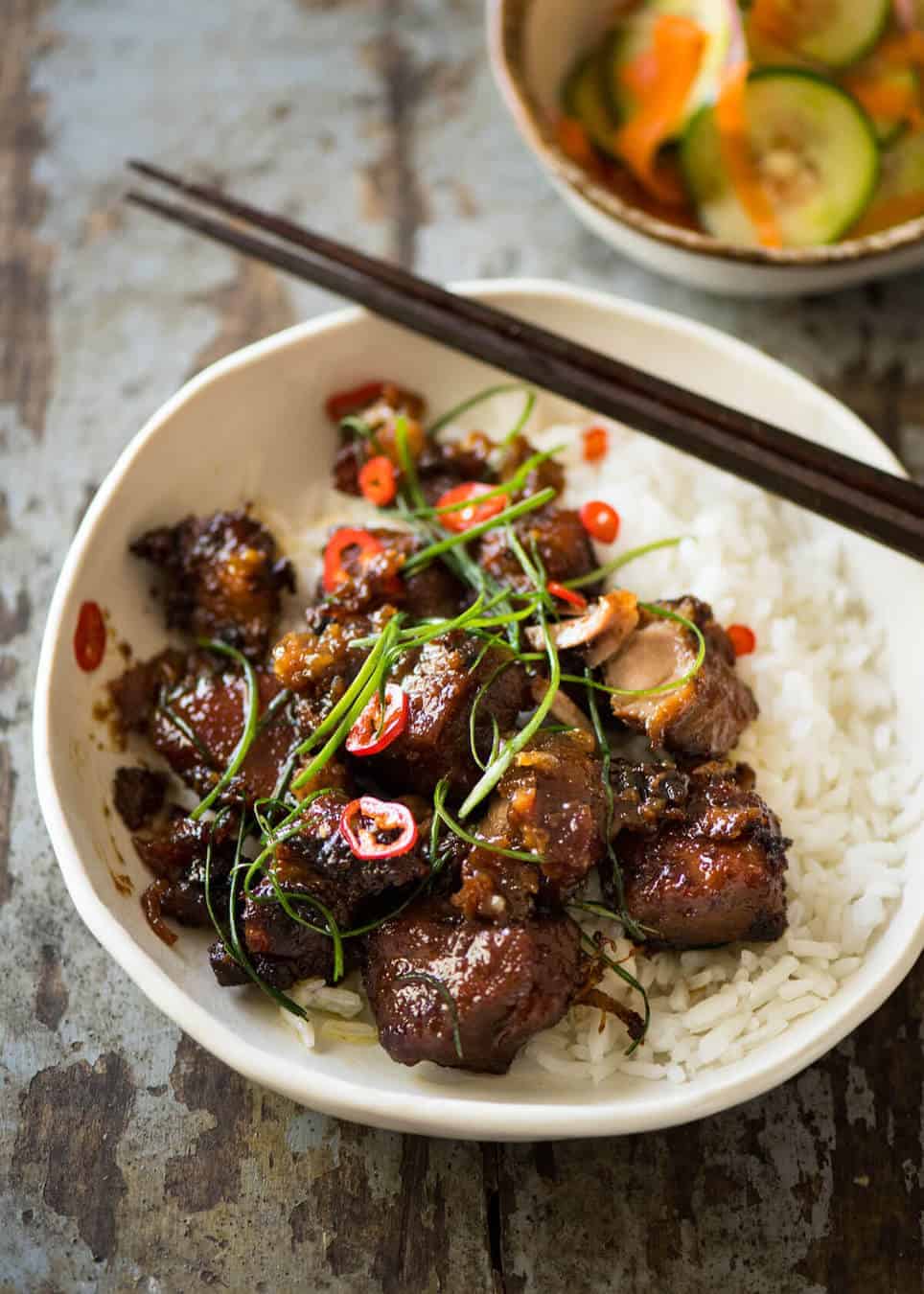Complete your Vietnamese banquet with fresh Vietnamese Rice Paper Rolls to start and a side of fluffy coconut rice. And don’t miss the chicken version – Vietnamese Coconut Caramel Chicken!

Vietnamese Caramel Pork is one of those gems that seem exotic, yet is unbelievably simple AND you can get everything you need at your local supermarket. The pork is braised until tender, and looks completely unimpressive until the last 5 minutes when it magically caramelises and turns into something that you’d pay serious $ for at a posh Asian restaurant.
It’s sweet yet savoury, and the pork is fork tender. It’s called Thit Kho To in Vietnamese, and it’s traditionally made with pork belly. Personally, I prefer making it with pork shoulder (butt) because I find pork belly too fatty.
I just realised – I call this “fork tender”, but I guess it’s more appropriate to say “chopstick tender”…

There is one ingredient in Vietnamese Caramel Pork that you may not have in your pantry but is sold in all major supermarkets nowadays – coconut water. If you’re into healthy smoothies, you may well have some stashed away!!!
It’s not expensive, $2 – $3 depending on where you get it (Asian grocer stores are cheaper), and it’s essentially the “secret ingredient” for this recipe.
It doesn’t really taste like coconut, it’s sort of salty and sweet. Which makes it ideal to use as the broth for this recipe.
Substitute for coconut water?
Make it with coconut milk! I’ve tried it, and it’s great. A little saucier, a little sweeter, with a slight coconut flavour and smell that you don’t get in the traditional recipe.
I promised you this is simple – and it really is, which you’ll see in the video. It goes down like this:
Put brown sugar and water in a pot, bring to simmer to make a caramel;
Add pork, fish sauce*, garlic and eschallots**
Simmer for 1.5 hours until the pork is tender. Then magically, the pot of pale brown meat pieces in a murky liquid suddenly transforms into bronzed pieces of delectable, ultra tender pork that just melts in your mouth.
* NO it will not taste fishy! It’s the Vietnamese version of soy sauce!
** French shallots, shallots, depending on where you live. The baby onions.

Because the glaze has quite a strong flavour, I like to serve this with plain white rice. Steamed jasmine rice would be on point.
And for a fresh side, a crunchy Asian Slaw would be very fitting – and the fresh flavour will be great to balance the richness of the pork. Or toss steamed vegetables or a garden salad with this Asian Sesame Dressing or the Nuoc Cham in this Lemongrass chicken recipe.
“This Vietnamese pork recipe is a Vietnamese food speciality. One bite, and you’ll understand why!”
I love recipes like this. Forgiving, tastes exotic, kapow! flavours. It sounds and looks exotic, but the flavours are universally appealing.
Asian Food Lovers – this is for YOU! It’s an absolute ripper that I think you’ll love! – Nagi x


Author:Nagi
Prep: 10 mins
Cook: 1 hr 30 mins
Total: 1 hr 40 mins
Main: Vietnamese
Ingredients
▢1/2 cup / 100g brown sugar, tightly packed
▢1 tbsp water
▢1 kg / 2 lb pork shoulder (butt) or boneless skinless pork belly, cut into 3 cm / 1.2" pieces (Note 1a)
▢1 1/4 cups / 375 ml coconut water (Note 1b)
▢1 eschallot / shallot , very finely sliced (Note 2)
▢2 garlic cloves , minced
▢1 1/2 tbsp fish sauce
▢1/4 tsp white pepper
GARNISHES:
▢Red chilli and finely sliced shallots/green onions
Instructions
- Place sugar and water in a large pot over medium heat. Stir, then when it bubbles and the sugar is melted (it looks like caramel), add the rest of the ingredients.
- Stir, then adjust the heat so it is simmering fairly energetically. Not rapidly, not a slow simmer (I use medium heat on a weak stove, between medium and low on a strong stove).
- Simmer for 1.5 hours, uncovered. Stir once or twice while cooking.
- At around 1.5 hours, when the liquid has reduced down and the pork is tender, (see Note 3 if pork is not yet tender), the fat will separate (see video).
- Stir and the pork will brown and caramelise in the fat.
- Once the liquid is all gone and it's now stuck on the pork pieces, it's ready.
- Serve over rice, garnished with fresh chilli and shallots. Simple pickled vegetables are ideal for a side because the fresh acidity pairs well with the rich pork.
Recipe Notes:
1b. Other proteins/cuts: This recipe is suitable for slow cooking cuts of pork like shoulder/butt and belly. Please don't try this with tenderloin or loin - it will be too dry, there is not enough fat in those cuts.
This recipe will also work great with beef - use slow cooking cuts like chuck, gravy beef and brisket. I don't think the flavours will work with lamb. And I've now shared the chicken version - Vietnamese Coconut Caramel Chicken (it's stickier / saucier).
1b. Coconut water is different from coconut milk. It's more like a whitish water, and it tastes salty / sweet, and not really of coconut at all. It's sold at supermarkets here in Australia in the drinks aisle - it's popular for "healthy" smoothies and the like, and costs $2 - $3 (Asian stores are cheaper).
This recipe does actually work great with coconut milk as well, and I've since shared a coconut milk version using chicken - Vietnamese Coconut Caramel Chicken.
2. Eschallots are also known as French shallots / French onions and look like small onions. Don't get too hung up on this - you can even use normal onions, finely chop 1/4 cup.
3. PORK TENDERNESS: The variable in this recipe is the time it takes for the liquid to reduce down vs pork being tender. If your pork is not quite tender enough by the time the braising liquid is almost evaporated, just add 1/2 cup water and keep cooking.
4. Simple Pickled Vegetables: Use a carrot peeler to peel ribbons from 1 carrot. Slice 2 cucumbers. Place 1/2 cup rice vinegar (or cider vinegar), 1/4 tsp salt and 1 tbsp white sugar in a bowl, stir. Add carrot and cucumber, stir. Set aside for 20 minutes until the vegetables soften then drain. Coriander/cilantro and mint are great additions to a simple pickled veg like this. Serve with pork.
5. Adapted from various recipes from Vietnamese cookbooks and this one from Luke Nguyen SBS Food (I found the liquid ratio too high).
6. QUICK VERSION: Here is a quick version inspired by this recipe that I have shared using pork mince (ground pork) -> Vietnamese Caramelised Pork Bowls.
7. The calories in the table below are overstated because it assumes all the fat in the pork shoulder is consumed but there is fat left in the pot after serving.
This recipe and image sources are referred in website: Recipetineats.com. Thanks so much!
 Asian Recipes
Asian Recipes




















No comments :
Speak Your Mind: